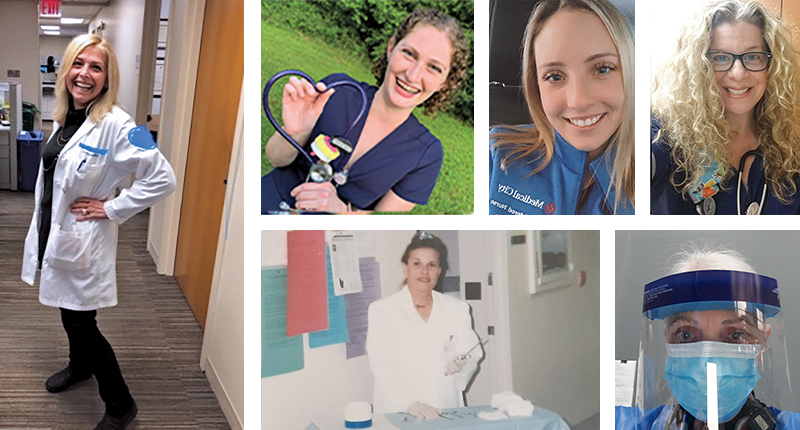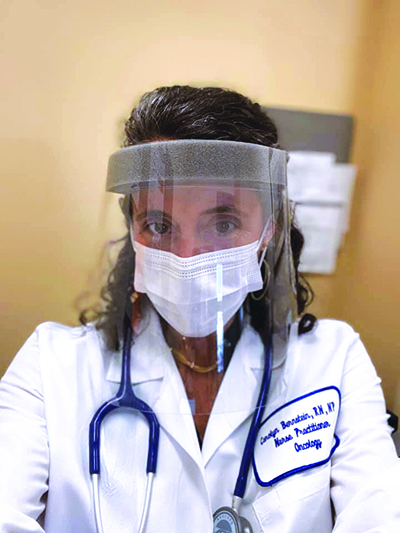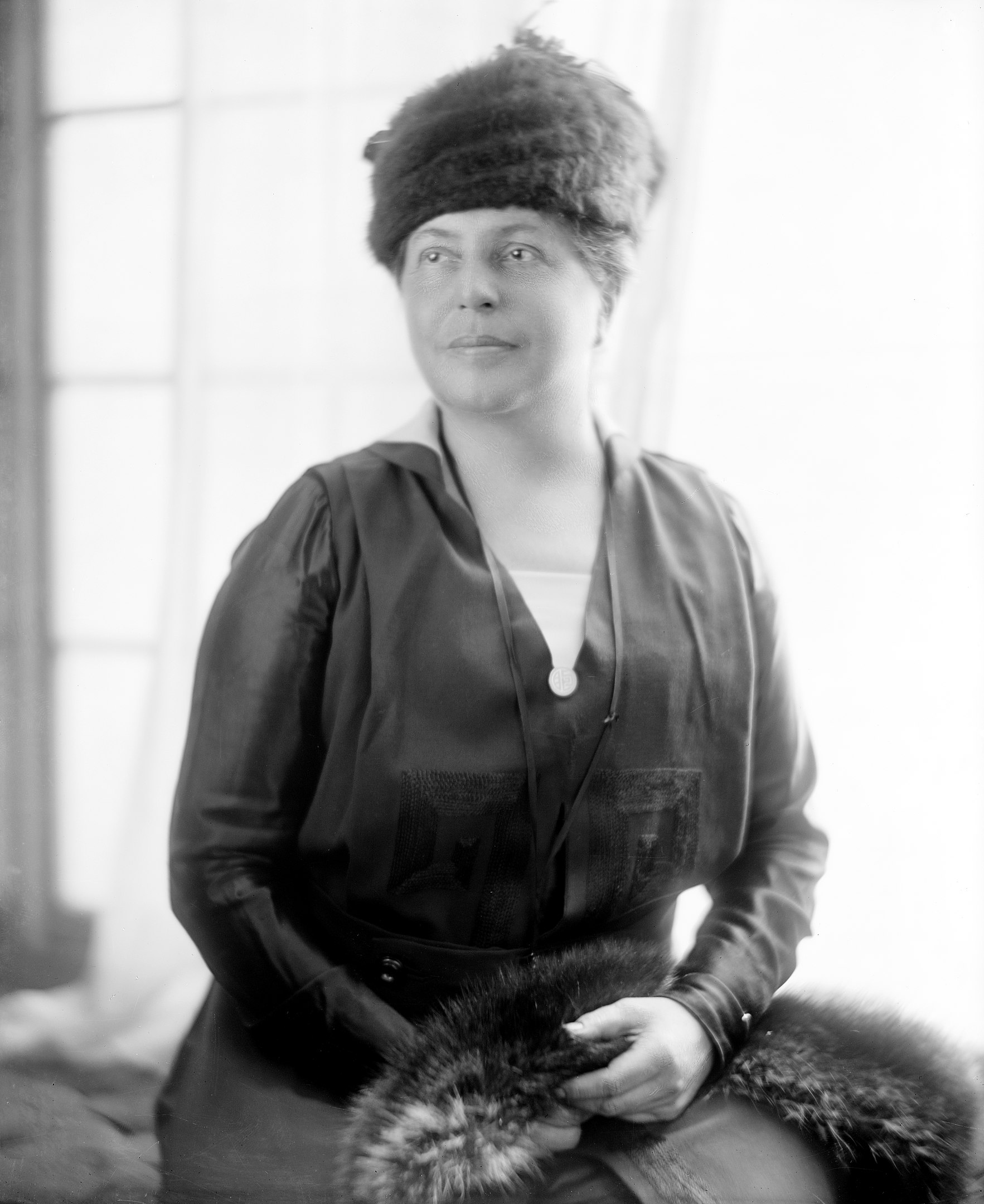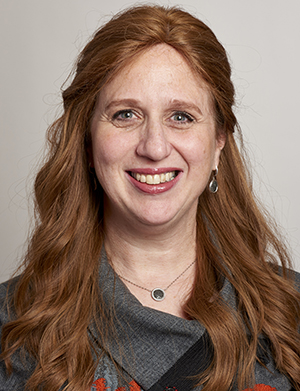American View
Hands-On Healing: Jewish Nurses, Yesterday and Today
Like many Jewish parents in the 1950s, Barbara Heller’s mother and father didn’t think nursing was good enough for their daughter. “Everyone was trying to talk me into teaching or medicine,” recalls Heller, whose career has included research at the National Institutes of Health alongside Dr. Anthony Fauci, the nation’s top infectious disease expert. “It wasn’t seen as a profession for a young woman with a lot of aptitude. But I had older parents with health issues, and I felt I could do more good in nursing.”
By the time Blima Marcus was considering various health care professions, “nursing was gaining a lot of traction for Jewish women,” says the mother of two young children. Treating Covid-19 patients this year at New York City’s Memorial Sloan Kettering Cancer Center, Marcus has found herself on medicine’s front lines—a level of responsibility, and respect, hard won in the years since Heller’s generation donned the mid-20th century uniform of stiff white caps and aproned dresses.
Today, nurses can also be doctors (Heller has a doctorate in nursing education; Marcus holds a doctorate of nursing practice) and men can be nurses—and all of them can wear pants to work. Though the timing may have been coincidental, it’s fitting, given the high-profile heroism of Covid-19 nurses, that 2020 is the World Health Organization’s International Year of the Nurse and the Midwife, honoring the 200th anniversary of the birth of Florence Nightingale, the vocation-defining British nurse.
“The things we’ve accomplished in my lifetime, it’s amazing,” reflects Heller, 80, former dean at the University of Maryland School of Nursing in Baltimore, “from wearing a cap and tending to my father, who was my first patient, to traveling around the world and doing research.”
Heller pioneered the world’s first master’s in nursing informatics at the university. And from Baltimore, Heller, a Hadassah member, spearheaded the nursing graduate program at the Henrietta Szold Hadassah-Hebrew University School of Nursing. What hasn’t changed, Heller adds, is that “nursing appeals to those with a nurturing side. It’s an opportunity to contribute to the welfare of the community.”

Nursing is America’s largest health care profession, with more than three million practitioners in settings as diverse as primary care offices, schools, midwifery clinics, research laboratories and, of course, hospital wards. Despite the fact that, according to many accounts, Jews are underrepresented in the field, Jewish nurses have played crucial roles in the profession’s development—from 19th-century trailblazer Lillian Wald, considered the founder of American community nursing, to contemporary pioneers like Heller.
The credentials needed for most entry-level positions have evolved from a two-to-three-year diploma to a bachelor’s degree in nursing, and the ambitious can go on to specialize in everything from anesthesiology to geriatrics.
The once sharp line between medicine, physician care and nursing is increasingly blurry, says Heller. Nursing, however, has a greater emphasis on patient care as well as flexibility at every stage of training and career, with myriad options—part-time, full-time, overnight shifts—and job availability throughout the United States, thanks to countrywide nursing shortages. And nursing salaries are more competitive than ever: A registered nurse can earn from $50,000 to $100,000 a year, while a nurse practitioner might command $150,000 or more.
Flexibility and bright prospects were what attracted Carolyn Bernstein to the field. Bernstein, 44, is a nurse practitioner at Kaiser Permanente’s oncology clinic in San Rafael, Calif. She worked part time while attending nursing school and pivoted from high-stress emergency medicine, where she might have 24-hour shifts, to a 9-to-5 clinic when the first of her three children was born. “I value balance in my life,” says Bernstein, who is often approached by Jewish acquaintances considering the field.

The daughter of a physician and a therapist, Bernstein considered medicine and naturopathy before deciding that nursing checked all the boxes. “By definition, nursing is integrative; you’re attuned to the psycho-social issues,” she says. “I love that I can do differential diagnosis, but I’m also not the last stop. I can email a doctor and say, ‘Hey, take a look at this.’ ”
And for practitioners today, nursing appeals for the same reason it always has: human contact. “Nurses notice changes by the hour, whereas physicians wouldn’t,” says Marcus, 35, the Sloan Kettering nurse. During the coronavirus surge at her hospital, where patients died lonely deaths in isolation units, one woman in particular forced Marcus to wrestle with her calling. “She was in her 50s, Covid-positive and a few days from passing,” Marcus recalls.
In those early, uncertain days of the pandemic in March, nurses were encouraged to observe and even speak to patients through a window. After weeks of withholding the human connection so essential to nursing, Marcus recounts, “it felt unconscionable to me to go on rounds and barely see or talk to patients.” So, wearing PPE, she spent 45 minutes carefully removing tubes from the patient’s nose and stomach to ease her nausea as their faces hovered inches from each other’s.
That consciousness also informs Marcus’s work as president of the EMES Initiative, which stands for Engaging in Medical Education with Sensitivity, an organization she founded to dispel vaccine misinformation prevalent in New York’s Orthodox communities. “There’s an ongoing need for accurate information that comes from a place of trust,” says Marcus, who is Orthodox. EMES now counts more than 50 Jewish health professionals in Orthodox communities nationwide who respond—one phone call and meeting at a time—to concerns around circumcision, breast cancer and, now, Covid-19.
Nancy Falchuk knows something about finding community with other Jewish nurses. A former operating room nurse and medical administrator as well as a past national president of Hadassah, the Women’s Zionist Organization of America, she co-founded in 1990 the Hadassah Nurses & Allied Health Professionals Council, the first national organization for Jewish nurses. “Nurses are the backbone of patient care,” says Falchuk, 75. “There’s a respect now for what nursing brings to health care, and that’s beautiful.”
Learn about the history of Hadassah Nurses & Allied Health Professionals Council in Advocacy and Connection, Hadassah’s Nurses Council, and read about the rich and varied careers of Hadassah members who worked in the nursing field in Members Share Their Nursing Stories.
One of the Nurses Council’s youngest members is Rachel Rose Rudberg, a 25-year-old critical care nurse at Baylor University Medical Center in Dallas. Rudberg knew few other Jews while studying nursing at Texas Christian University, and she rarely encounters Jewish nurses professionally, which is a primary reason she turned to Hadassah’s Nurses Council.
Having endured numerous hospital stays throughout her youth—Rudberg has severe asthma and a gastrointestinal condition—she knew nursing was a good fit. “Doctors come by, but we’re the ones who really get to have the relationships with patients,” she notes. “We’re the ones guiding their care.”
That care can go far beyond monitoring vital signs and catheters, administering IV’s and medications. Rudberg was moved by a young mother who was recently hospitalized for postpartum cardiomyopathy, a rare complication that causes heart failure. “When she was transferred here, her hair was matted,” Rudberg recalls. “So I brought my conditioners and my comb, and we had a pampering party.”
Immunocompromised herself, Rudberg works with non-coronavirus patients, but the pandemic is not so easily bypassed. As the outbreak intensified, she says, her hospital has felt the strain of staff shortages as employees became sick or were quarantined. The Covid-19 risk has limited visitors at facilities nationwide, so Rudberg and other nurses report setting up FaceTime with families to keep patients’ spirits up.
Video chat is among the newer tools in nurses’ arsenals, but as the occupation has changed over time, one constant is the role played by Jewish women. Lillian Wald, a progressive-minded Jewish nurse from Cincinnati who graduated from Vassar College, founded the still-thriving Henry Street Settlement, a New York City clinic whose health care model was replicated across the country. Naomi Deutsch, who worked at Henry Street and knew Ward, was another public health leader. In 1935, she was tasked with organizing and directing the Public Health Unit of the United States Department of Labor’s Federal Children’s Bureau in Washington, D.C. During World War II, Frances Slanger was one of only four U.S. Army nurses to wade ashore in Normandy on D-Day. Killed by German artillery fire five months later, she was awarded a posthumous Purple Heart.
Those relatively modern examples reflect the fact that nursing as we know it is only a few hundred years old. For centuries, nursing care was associated with Catholic religious orders and with nuns in Christian-run institutions. Urbanization in the 1800s spurred formal training programs, but the vocation remained relatively low status for another century, with widespread discrimination against Blacks, Jews and other minorities.
In the late 19th and early 20th centuries, cities with growing Jewish populations, like New York, Boston, Cincinnati, Philadelphia and Chicago, saw the creation of Jewish-sponsored hospitals and educational programs for those marginalized by anti-Semitism. Among the mix was Mount Sinai Hospital in New York City, whose school of nursing graduated Marlene Post—another Hadassah past president and current chair of Hadassah Magazine.

“It’s a Jewish ethic, to be helping others,” says Post, 82, who grew up in the Catskills region of New York watching nurses treat polio victims. Then, as a teenager, she witnessed the way nurses tended to her then-boyfriend’s mother after she was injured in an automobile accident. “The physicians you didn’t see so much of, but watching the nurses take care of her, truthfully that moved me,” Post recalls of her frequent visits to the hospital. “I knew I wanted to be a nurse.” But she still had to win over her reluctant parents.
That’s because, as Falchuk says about the postwar years, “Jewish parents weren’t crazy about their daughters changing bedpans.” Ironically, Jesuit nurses at St. Joseph’s Hospital in Queens, N.Y., inspired Falchuk, hospitalized there after an appendectomy at 16. Years later, as she organized the Nurses Council, Falchuk found that little had changed: “Everyone said the same thing—that they never put together being a Jew, being a nurse and being a woman.”
What differs today is the absence of the overt prejudice that she and others had confronted early in their careers. “In the changing room, you’d hear other nurses talking about kikes, and it was very, very painful,” says Falchuk, who worked in hospitals in New York City and Boston, where she eventually settled. She recalls one patient who insisted: “ ‘You see that Jewish doctor? I’ll never let a Jew touch me.’
“Needless to say,” Falchuk adds, “he didn’t know his nurse was Jewish.”
While some biases may persist, Toby Bressler, who oversees oncology nursing for the Mount Sinai Health System, illustrates how different it is for Jewish nurses today. Founder of the Orthodox Jewish Nurses Association, she mentors Jewish colleagues on how to negotiate High Holiday absences and modest dress.
“We’re the voice for Jewish nursing on issues of inclusion in the workplace,” says Bressler, 47. She founded the association in 2008, starting with 50 nurses trading tips on a Facebook page. It has grown to 2,200 members from across the Jewish spectrum and was the first faith-based affiliate of the American Nursing Association.
Bressler’s journey is another example of how modern nurses shape careers around family and lifestyle. Bressler was a preschool teacher with six children when she turned 30 and told her husband she wanted to be a nurse. “And he said, ‘Go for it,’ ” recalls Bressler. As she pursued her dream, she did homework at the kitchen table alongside her children, the seventh of whom was born just days before her last exams.

Bressler was inspired by a beloved aunt who died young of breast cancer. Her doctoral research for her Ph.D.—completed at Molloy College, a Catholic institution, chosen because of its support for religious observance—focused on the Jewish cancer gene that killed her aunt. Bressler took that knowledge into her own Orthodox Brooklyn neighborhood, counseling families.
“As we expand women’s roles, we embed that expertise into our communities,” reflects Bressler, one of whose daughters recently graduated from nursing school.
Reflecting on her own choice, made generations earlier, Post notes that her career enriched her life in innumerable ways—from dinner-table conversations with her husband, a gynecologist, to visits to Hadassah’s two hospital campuses in Israel. “It’s a satisfaction that you carry always,” she says. “As a nurse, you talk to the patients, change their spirit. You can hold their hand and feel that you’re getting through. You know you’re doing something good in life.”
Hilary Danailova writes about travel, culture, politics and lifestyle for numerous publications.










 Facebook
Facebook Instagram
Instagram Twitter
Twitter
ephraim says
will be a doctor yes nurse
liove you ephraim mon aug14 dinner
blaimtore see you augst
ilove ephraim
tankyou
see you tirp mon
liove ephraim
liove you
ephraim
mon